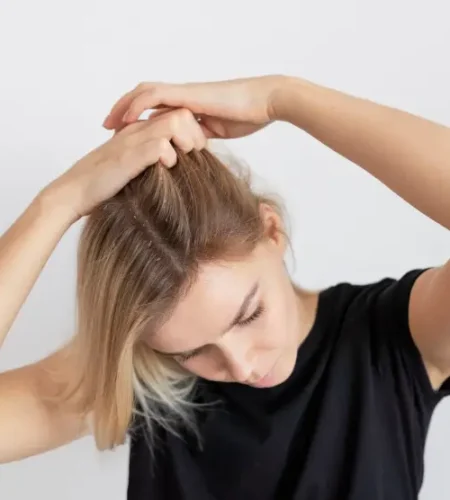If you’ve ever sat through a meeting or movie furiously scratching your head or trying hard not to, you’re not alone. An itchy scalp is one of those annoyingly common but often misunderstood issues. It’s uncomfortable, sometimes embarrassing, and can even mess with your hair health.
So, what exactly causes that maddening itch? And how do you stop it for good? Let’s break it down.
The Usual Suspects
Before we talk about a proper itchy scalp treatment, let’s first figure out what actually causes an itchy scalp.
Dry Skin
This is the most basic reason. Dry scalp can happen due to harsh shampoos, over-washing, cold weather, or even dehydration. It usually comes with small, dry flakes – not to be confused with dandruff, which is a bit more complex.
If your skin feels tight, flaky, and gets worse after washing, dryness might be the culprit.
Dandruff
Dandruff is caused by an overgrowth of yeast-like fungus called Malassezia that feeds on oil. It leads to inflammation, flakes, and that persistent itch.
While flakes alone are more oily and yellowish, with dandruff, you may notice redness and irritation as well.
Product Buildup
When you pile on products like gels, dry shampoo, sprays, or even heavy oils, your scalp can get clogged, leading to itching and irritation.
If your scalp feels greasy but itchy, hair looks full, and you notice residue under your nails after scratching, this is the reason.
Allergic Reactions
If you recently switched hair products and now your scalp feels like it’s taking revenge, you could be having an allergic reaction. Ingredients like sulphates, parabens, fragrances, or even natural essential oils can trigger irritation.
If your itching started after using a new product and you have redness and bumps, there’s a high chance it’s your allergies.
Psoriasis
This autoimmune condition speeds up skin cell turnover, causing scaly patches that can itch. It’s often misunderstood as stubborn dandruff, but it needs a different kind of care.
Lice
This one is, unfortunately, not just a school kid problem. Lice can happen to anyone, and they love roaming around on your scalp. The itching is caused by their bites and your allergic reaction to them.
These parasites are known to cause intense itching, especially behind the ears or at the nape of your neck.
Fungal or Bacterial Infections
In some cases, your scalp could be reacting to an actual infection, like ringworm or folliculitis. These conditions need proper medical treatment and shouldn’t be left alone.
How to Treat Your Itchy Scalp
Now that we’ve dragged the culprits into light, let’s talk solutions.
Hydrate and Moisturise
Start by switching to a gentle, sulphate-free shampoo. Look for products with ingredients like:
- Aloe Vera
- Coconut oil
- Hyaluronic acid
Wash your hair less often, use lukewarm water, and don’t forget to moisturise your scalp.
Scalp Massages and Oils
Scalp massages not only feel incredible but also boost circulation and product absorption. Use oils like:
- Tea tree oil
- Peppermint oil
- Jojoba or argan oil
Always dilute essential oils and do a patch test first. Your scalp may be sensitive.
See a Dermatologist
If you’ve tried everything and still find yourself scratching your head, it’s time to get professional help. You may need prescription treatments, medicated shampoos, or even allergy testing.


Comments